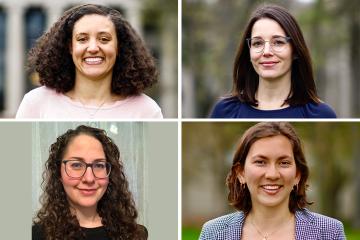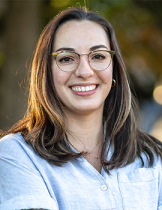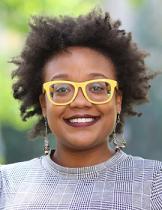
Behind the Economics Transformation Project: Get to know our Instructional Designers

J-PAL North America’s Economic Pathways work aims to expand access to the field of economics at every juncture in the professional pipeline, from high school to tenure.
In 2023, a core component of this work was referred to as the Economics Transformation Project (ETP), which delivered economics workshops to high school students, many of whom had backgrounds that were underrepresented in the field. These workshops were made possible by instructional designers Lucas Kaplan and Laura Lee Smith. In this interview, Lucas and Laura Lee shared how their backgrounds informed their approach to instructional design and why they believed this work was so important.
What were your backgrounds before coming to ETP, and how do they complement each other?
Laura Lee: I am getting my doctoral degree in higher education at the University of Michigan. I especially love working with young people because of the way they can remix ideas and change your perspective. I think a lot about what happens in classrooms and about education for liberation, so everything about how ETP is disrupting how economics is traditionally taught makes sense to me. And, at heart, I'm a theater kid, so being lively and entertaining and taking these high-level concepts and making them digestible is just so fun for me.
Lucas: ETP was a particularly good fit for me given my combined background of economics and teaching. I have a Master’s degree in economics, and I am currently working towards my PhD in economics at Syracuse University. Prior to that, I was a high school teacher and worked in schools with students from low-income communities.
Laura Lee: It was nerve-wracking joining ETP because my background is not in economics, but one of the best things about being an educator is being able to stretch your comfort zone. Some of my biggest learning moments come from watching Lucas teach these really complex topics. I bring my own expertise into how we teach these topics too. I’ll ask, “Are we going to be talking about intersectionality?” and Lucas is always there to say, “Yes, and how do we bring it back to economics?”
Lucas: Similarly, I think our backgrounds and skills pair very well together. Laura Lee’s got this ability to make a space feel really awesome with how she engages with the students.
Why do you think these efforts are important?
Lucas: ETP aims to disrupt the dominant, self-sustaining system that's happening in economics—a field historically led by white men—where those with the most power in the field are only representing a particular worldview in their research.
Laura Lee: Historically, when you think of economics, you just think of white men, like Lucas said, and numbers. There isn’t really a soul behind it. I have been humbled through my work with ETP to see that individuals in the field of economics are working hard to change that perception. ETP is also a way to connect educators who would have written off economics before and make them realize, “Wait a minute. I want my young people to have this exposure. I want them to feel confident taking an introductory economics course in college, because they've had an opportunity to go to a program run by J-PAL North America on a campus like MIT.” That can be a huge deal, particularly for individuals like myself who didn't have all of the opportunities that more resourced young people have.
Can you explain more about what you do as an instructional designer for ETP?
Lucas: Our job is to write and present a curriculum to high schoolers and also train others to present a similar curriculum. Our goal is to tailor the curriculum to students who have been historically marginalized by the field of economics and to center issues of social justice in our workshops.
Laura Lee: We’re introducing the students to economics, but we're also thinking about identity and oppression and matrices of power. It’s really “data with a soul.” It’s also part of our job to let students know that being an economist can mean a range of things and that they can make a difference in people's lives.
Lucas: I firmly believe that learning primarily happens through doing, so thinking about how students will be engaged is a starting point for me when designing the workshops. Then, we think about how we can truly bring a social justice and anti-poverty lens to economics. I feel an obligation to both teach students material grounded in rigorous science and to help them become better citizens of the world.
Laura Lee: I follow a lot of sentiments from bell hook’s Teaching to Transgress—it’s about deconstructing what happens in the classroom, shifting the power dynamics, and entering the space as learners ourselves. We also have to strike a balance between making sure the students are informed but also able to think for themselves around these issues of social justice and humanity.
What is your favorite part about the work that you're doing with ETP?
Laura Lee: ETP has helped me fall back in love with being in the classroom since the pandemic. It's been amazing to bring students of color to MIT through our programming.
Lucas: During one workshop as students shared their research ideas, I thought, “I can see every single one of these students being back in this MIT classroom four years from now, eight years from now, twelve years from now.” Really, these are our future researchers and leaders. I think that the space we provided them at MIT was really transformative.
Is there anything else you want to add about your experience with ETP?
Laura Lee: I want to shout out my colleague Jatnna Amador for being an amazing leader and guide, as well as my colleague Bridget Mercier who is an amazing manager.
Lucas: There’s still a lot of work to be done in the field of economics, and I think that work like this needs to become even more widespread to see a greater impact. I think this aligns with what Esther Duflo and Amy Finklestein envisioned when they had the idea for ETP.
Related Content

Broadening participation in economics, part one: How J-PAL North America's collaborative high school program was built

Broadening participation in economics, part four: Mentorship program development considerations



